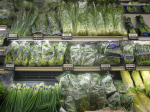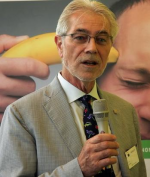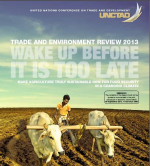News
21.10.2013
Tesco: 68% of bagged salads are wasted

Britain's biggest food retailer Tesco estimated that, in the first six months of this year, almost 30,000 tonnes of food were wasted in its stores and distribution centres across the UK. Using the latest figures published by the Waste and Resources Action Programme (Wrap), Tesco calculated the food waste footprint for 25 of the supermarket’s best-selling products. The research found that 68% of salad sold in bags does not make it from farm to fork, with 35% being thrown away by consumers. Tesco announced to end multi-buys on large bags of salad and offer smaller bags. Bakery produce makes up the largest part of food wasted in Tesco stores and 47% of bakery items were wasted in the UK. Tesco said it will rearrange its 600 in-store bakeries to reduce the amount of bread on display. Tesco also estimated that 40% of apples, 24% of grapes and 20% of bananas were wasted along the food chain. One in ten bananas is thrown in the bin by consumers. The retailer announced to remove “display until“ dates from fresh fruit and vegetables and to use smaller cases to help customers reduce the amount they are wasting.
16.10.2013
World Food Prize Goes to Monsanto and Syngenta

On October 17, this year’s World Food Prize will be awarded to executives at chemical-biotechnology companies Monsanto and Syngenta for developing genetically modified organisms. The three laureates sharing the 250,000 dollar prize are Robert Fraley, executive vice president and chief technology officer at Monsanto; Mary-Dell Chilton, founder of Syngenta Biotechnology, and Marc Van Montagu, a Belgian biotech pioneer. According to the World Food Prize Foundation, they “each conducted groundbreaking molecular research on how a plant bacterium could be adapted as a tool to insert genes from another organism into plant cells.” The scientists receive the prize for “making it possible for farmers to grow crops with: improved yields; resistance to insects and disease; and the ability to tolerate extreme variations in climate”, the Statement of Achievement says. The decision was heavily criticized when the winners were announced in June. In an open letter, 81 recipients of the Right Livelihood Award, known as the ‘Alternative Nobel Prize’, condemned the selection of GMO scientists as “a terribly wrong signal for the future of food security and agriculture”. Indian food expert Vandana Shiva said: “Not only are GMOs unsafe, they are destroying biodiversity, increasing farmers' dependency on seed and chemicals and leading to the emergence of super pests and super weeds.” Monsanto and Syngenta are both major sponsors of the World Food Prize Foundation, which accepted a 5 million dollar donation from Monsanto in 2008.
08.10.2013
Open Letter: Promotion of Biofuels is Undermining Right to Food

“The Committee on World Food Security (CFS) must not allow itself to be captured by biofuels interest groups”, 80 civil society organizations, including Save Our Seeds, warn in an open letter issued on the occasion of the 40th annual plenary meeting of the UN-sponsored Committee, held this week in Rome. The CFS is discussing recommendations (a so-called Decision Box) on biofuels. On Monday and Tuesday afternoon, a round table with the topic ‘Biofuels and Food Security” was held. The signatories expressed concern that the recommendations in the current CFS draft Decision Box would not protect the right to food from existing biofuels policies and the growing demand for biofuels. “This should be an important opportunity for the CFS to respond to the overwhelming evidence that the artificial demand for biofuels is undermining the right to food, causing significant increases in food insecurity, malnutrition, and land grabbing”, they warned. As a recent report on Biofuels and Food Security published by the the Committee’s High Level Panel of Experts (HLPE) showed, biofuels have been an important driver behind food price rises and food price volatility in recent years. This means, the letter goes on, that the CFS must call on governments to eliminate direct and indirect subsidies for biofuels, including blending quotas, acknowledge the conflict between biofuels and food and ensure that the objective to eliminate hunger and food insecurity is paramount.
01.10.2013
New FAO Report: 842 Million Suffering from Hunger

According to a new report published today by the Food and Agriculture Organization (FAO), 842 million people are chronically undernourished worldwide. This means that in the period 2011-13 one in every eight was suffering from hunger. The majority of the hungry live in developing countries, most of them in Southern Asia (295 million), followed by sub-Saharan Africa (223 million), the region with the highest prevalence of undernourishment, with one in four going hungry. The new figure is somewhat lower than the 868 million hungry reported last year. The FAO said the main reasons were continued economic growth, renewed interest of private investors in agriculture, as well as remittances from migrants to their home countries which helped reduce poverty. The report is optimistic that the UN Millennium Development Goal (MDG) target of halving the proportion of the world’s hungry by 2015 could just be reached if the average rate of decline continues. According to revised estimates, in the base period 1990-92, about 23.6% of people in developing countries were undernourished while the current figure is at 14.3% - still above the goal of 11.8%. The more ambitious target of the 1996 World Food Summit to halve the number of hungry people in developing countries is out of reach: The number would have to drop to 498 million people from the 995 million in 1990-92. The report defends the FAO's revised methodology which has earned criticism for underestimating undernourishment by assuming energy requirements for a minimum level of physical activity while poor people often face hard manual labour. The indicators used to measure undernourishment were also criticised for only capturing hunger lasting more than a year and neglecting micronutrient deficiencies. The report wants to address these limitations with a “new suite of indicators that aim to capture the multiple dimensions of food insecurity”.
27.09.2013
'Alternative Nobel Prize' awarded to Hans Herren

Swiss agronomist Hans Herren received the Right Livelihood Award “for his expertise and pioneering work in promoting a safe, secure and sustainable global food supply”. The four winners of the prize often referred to as ‘Alternative Nobel Prizes’ were announced on Thursday at a press conference in Stockholm. Hans Herren, president of Biovision Foundation and the Millennium Institute, is a leading expert on biological pest control and sustainable agriculture. He has been credited with saving millions of lives by implementing a biological pest control programme when a new pest threatened the cassava root in Africa. Herren co-chaired the International Assessment of Agricultural Knowledge, Science and Technology for Development (IAASTD) and has constantly been working at international level to promote the implementation of the report. The laureate sees the award as an endorsement of his vision: A world which can feed nine billion people expected to live on our planet in 2050 with sufficient and healthy food. “This is only possible, if we invest in smallholder structures with sustainable and efficient ecological cultivation methods and move away from the paradigm of industrial agriculture which overuses natural resources and destroys biodiversity”, Herren said.
20.09.2013
UNCTAD wake-up call: More support for small-scale farmers needed

A United Nations Conference on Trade and Development (UNCTAD) report published on September 18th calls for radical changes in agriculture and food production. Farming in rich and poor nations alike should shift from monoculture towards greater varieties of crops, reduced use of fertilizers and other inputs, greater support for small-scale farmers, and more locally focused production and consumption of food, the report recommends. The UN Trade and Environment Report 2013 warns that continuing rural poverty, persistent hunger around the world, growing populations, and mounting environmental concerns must be treated as a collective crisis. It says that urgent and far-reaching action is needed before climate change begins to cause major disruptions to agriculture, especially in developing countries. Almost 1 billion people currently suffer from hunger, and another 1 billion are malnourished, the report notes, even though current global agricultural production already provides sufficient calories to feed a population of 12 to 14 billion. Highest priority must be given to enabling the rural poor to become self-sufficient in food or to earn sufficient income through agriculture so that they can buy food.
12.09.2013
FAO: one-third of world’s food wasted annually
The waste of some 1.3 billion tons of food each year is causing economic losses of $750 billion and significant damage to the environment, according to an FAO report.
19.08.2013
African Food Sovereignty under attack by corporate interests
Alliance for Food Sovereignty in Africa (AFSA), a coalition of pan-African networks, with members in 50 African countries and representing smallholder farmers, indigenous peoples and civil society, met in Addis Ababa 12-16th August 2013 to formulate an action plan to safeguard Africa’s sovereignty over its food, seeds and natural resources from the assault on Africa’s food systems.
29.01.2013
EU Commission fails to ban bee-killing pesticides

The European Commission announced on Monday that, in response to a report from the European Food Safety Authority (EFSA) identifying risks posed to bees by ‘neonicotinoid’ pesticides, it will start to take some protective measures. However the Commission did not go far enough to placate environmentalists who, along with the EFSA itself, had called for a complete ban of neonicotinoid pesticides. According to the EFSA report, these widely-used insecticides affect the central nervous system of insects, causing paralysis and death. Recognising this concern, Health and Consumer Affairs Commissioner Tonio Borg said the Commission “will propose a series of ambitious but proportionate legislative measures”. However, he was criticised for stressing that “a total ban would not be justified.” Last week, in a debate in the European Parliament's environment committee, other opinions were voiced. Green MEP Bart Staes said: “While scientists and beekeepers have been sounding the alarm for almost two decades, there is now a wide and growing body of evidence on the devastating impact of neonicotinoids on bee populations. The only responsible course of action is to immediately push ahead with an EU-wide moratorium on neonicotinoids.” On 31 January, EU officials will discuss neonicotinoids further, and plan to announce an action plan following the discussions. It is generally accepted that the decline of bee populations poses a serious threat to agriculture. Two thirds of crops humans use for food production depend on pollination by insects such as bees. According to a UN report, the work of bees and other pollinators is worth 153 billion euros per year to the global economy.
24.01.2013
CAP Reform: Greening proposals watered down

On Wednesday and Thursday, the European Parliament’s Committee on Agriculture and Rural Development adopted its position in a vote on the reform of EU’s Common Agricultural Policy (CAP). In terms of direct payments to farmers, the result of the vote was a watering down of the Commission’s proposal on ‘Greening’ – linking payments to a set of measures that would improve the environmental performance of farms. ARC2020 – a coalition of 167 civil society organisations – reacted with disappointment: “A majority of members of the Committee have bowed to the pressures of the European agro-industry, which is taking farmers hostage for monocultures and factory farming,” said Benedikt Haerlin of ARC2020. The European Commission’s original proposal required three greening measures as a pre-requisite for receiving direct payments: crop diversification, the preservation of permanent pasture and management of 7% of every farms arable land as ‘ecological focus areas’ (EFAs). The Agricultural Committee’s position allows farmers to ‘opt out’ of these minimum requirements and still get at least 70% of the direct payments. In addition, it allows exceptions and loopholes to these measures. Crop diversification would be reduced to two different crops for farms between 10 and 30 hectares, with the proposed minimum of three crops now only applying to larger farms. The Committee also watered down the limits for the EFAs, proposing a minimum of only 3% of the farm area, which should then rise to 5% from 2016. The Commission had proposed 7%. In March, the draft adopted by the Committee will be examined and put to a plenary vote by all Members of the European Parliament. “The European Parliament must fulfil its responsibility towards European citizens who want to see green and fair farming that provides healthy food from wildlife-rich farms and diverse landscapes”, said Stanka Becheva, Food and Agriculture Campaigner at Friends of the Earth Europe.

